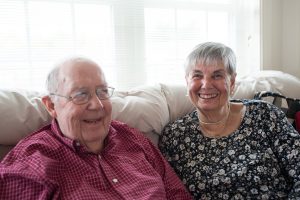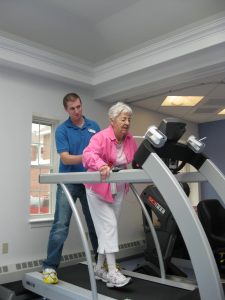 BOB NEEDED A PLUS ONE. His daughter, Kathryn Callnan, President and CEO of The Cedars, wanted him to join a family birthday celebration in Old Orchard Beach. He’d only been living at The Osher Inn for one month, but he knew exactly who he wanted to bring. “I’d noticed Lauretta in the dining room,” he explains, eyes twinkling. “This was my big chance.”
BOB NEEDED A PLUS ONE. His daughter, Kathryn Callnan, President and CEO of The Cedars, wanted him to join a family birthday celebration in Old Orchard Beach. He’d only been living at The Osher Inn for one month, but he knew exactly who he wanted to bring. “I’d noticed Lauretta in the dining room,” he explains, eyes twinkling. “This was my big chance.”
“And we’ve been together ever since!” Lauretta says.
Talking with Bob Callnan and Lauretta Torraca, they feel as though they’ve been together for years, not less than six months. Both widowed, they had each raised large families with loving partners before life brought them to The Osher Inn. When they found each other, they knew right away what a precious thing they had.
“We just melded our lives together,” Lauretta beams. “At this stage of our lives, we get to do what we want. There’s so much to do at this wonderful place, and it’s wonderful to do it all together.”
Today, you’ll find Bob and Lauretta sharing meals in the dining room or at a restaurant, apple picking at Sweetser Orchard, cruising Casco Bay on a ferry, or taking in a play or gallery opening downtown with their friends from The Cedars. Their families are incredibly supportive of their relationship and love to include them on family outings as well. “We’re going to North Conway this weekend with Lauretta’s daughter,” Bob says, “and to Houlton with my family next week.” Yet they still enjoy their independence and still love to spend time on their own—Lauretta to practice her art and her beloved piano, and Bob at one of his many exercise classes.
Bob’s cozy apartment is on the first floor and Lauretta’s sun-drenched apartment is on the second floor, and they both plan to keep their own space. But because Lauretta needs her medications dispensed by a nurse several times a day, spending time together—and spending the night together—meant sharing their relationship status with The Cedars staff.
“So many seniors imagine that assisted living means giving up your privacy,” Lauretta says. “That just isn’t true at The Osher Inn. The staff know that this is our home. From the moment we shared our relationship with them, they went out of their way to make sure we had our time together.”
They worked out a signal with their nurses. When Lauretta’s walker is outside Bob’s door, caregivers need to alert the couple before coming in. And staff found other ways to support their relationship, too. “My eyes aren’t very good anymore,” Bob confesses. “Lauretta reads me the menu in the dining room before we order. So the waitstaff started leaving just one menu at our usual table—they know it’s all we need.”
Caregivers and families can be challenged when loved ones form new relationships later in life, explains Richard Marino, MD, Medical Director at The Cedars. “As a society, we don’t always recognize that many needs and desires stay the same as our bodies age. As senior living communities, we don’t always respect the privacy of consenting adults. At The Cedars, we know needing help with activities of daily living doesn’t mean you need help deciding who to share your life with.”
Studies show that just like receiving the appropriate level of care, a loving, consensual relationship can enhance and extend the lives of seniors (see sidebar at left). As we age, we may lose some of the people we love, but not the desire to love and be loved in return.
Bob cheerfully admits to being a hopeless romantic, and he loves surprising Lauretta with tokens of affection. “I gave Lauretta my wedding ring,” Bob says. “She wears it on a gold chain.” It’s the perfect symbol of their relationship: an acknowledgement of the rich lives they enjoyed before they met, and a celebration of the rich life they share today. “It’s like finding a second life, finding her,” he says, squeezing Lauretta’s hand. “And it’s a good life.”



![books460[1]](https://www.thecedarsportland.org/wp-content/uploads/2015/01/books4601-150x150.jpg)


 BOB NEEDED A PLUS ONE. His daughter, Kathryn Callnan, President and CEO of
BOB NEEDED A PLUS ONE. His daughter, Kathryn Callnan, President and CEO of 
 Are you anticipating a rehabilitation stay in the new future? Whether you have an upcoming surgery scheduled, or you or a loved one is experiencing an unexpected rehabilitation stay, here are a few tips that may help your return home easier.
Are you anticipating a rehabilitation stay in the new future? Whether you have an upcoming surgery scheduled, or you or a loved one is experiencing an unexpected rehabilitation stay, here are a few tips that may help your return home easier.